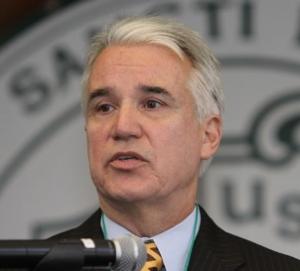special to Drug War Chronicle by Houston-based investigative journalist Clarence Walker, [email protected]
As marijuana legalization spreads into various states, some are allowing people who'd been previously been convicted of possession of a small amount of pot to clear their records.

According to the Drug Policy Alliance, over 574,000 American citizens were charged with simple possession in 2016.
"It really makes sense to not burden these people with a lifelong criminal record," Kate Bell, a lobbyist for the Marijuana Policy Project in Maryland, recently told the Washington Post.
Approximately 12 more states are considering marijuana legalization this year, with possibly more hopping on the express train as the continuing quest for marijuana legalization continue to roll down the tracks at full speed, making 2018 a pivotal year in the ever-growing movement to convince lawmakers to legalize pot in all 50 states.
"With over 60 percent of Americans now supporting the full legalization of marijuana for adults, the momentum behind marijuana law reform will not only continue but increase as we head into 2018," said NORML executive director Erik Altieri.

Recently at least 4,900 Californians petitioned the courts to have their prior marijuana convictions expunged off their criminal record.
Washington state legalized marijuana in 2012, yet many convicted citizens have been burdened with criminal records for simple misdemeanor pot convictions while slick wealthy investors make a killing selling legal weed. Moving to redress the injustice, Seattle Mayor Jenny Durkan announced in February that the city will toss several hundred low-level misdemeanor marijuana cases.
"The war on drugs ended up being a war on people who needed help, who needed opportunity and who needed treatment," Durkan told a news conference at the time.
Similarly, prosecutors in San Francisco will throw out thousands of marijuana-related convictions dating back to 1975. San Francisco District Attorney George Gascon said earlier this year his office will dismiss and seal 3,038 misdemeanor convictions from before the state's legalization of marijuana went into effect, with no action necessary from those convicted.
The moves make perfect sense. What else should happen to convictions for a victimless crime when that victimless behavior is now no longer a crime? American University Law Professor Jenny Roberts has an idea.
"If you've made a legislative determination that this is no longer criminal; why would you want to continue to have people feeling the ramifications of something that people going forward will no longer have to suffer?" she asked.

"Since this is now the law of Nevada, it's important we allow folks who have made these mistakes in the past to have their records sealed up," said Nevada Assemblyman William McCurdy, a Democrat who proposed a bill on the issue.
Oregon state law now allows people who'd been convicted of an ounce of marijuana or growing up to six marijuana plants to have their record sealed now that marijuana is legal.
But in Colorado, some lawmakers fought against the proposal. For example, the legislature considered a bill in 2014 to allow citizens to petition the courts to seal their criminal records for old convictions, but the bill died in committee after facing stiff opposition from prosecutors. The Colorado District Attorneys Council opposed the bill because, they argued, it allowed low-level drug dealers to wipe their records clean.
"There were many cases of (drug) distribution that were pleaded down to low-level (possession) felonies," said council executive director Thomas Raynes.
"The bill creates a horrible precedent by retrofitting criminal sanctions for past conduct every time a new law is changed or passed," objected Carolyn Tyler, spokeswoman for Republican Attorney General John Suthers.
This year, Colorado passed a less controversial law focused specifically on misdemeanor possession.
Nevada also suffered a mild setback. Governor Brian Sandoval (R) vetoed McCurdy's bill requiring judges to seal records and vacate judgments for marijuana offenses that are now legal.
"To the extent there are individuals suffering under criminal records for conduct now legal in Nevada, those cases are best handled on a case-by-case basis," Sandoval wrote in his veto statement. "Given other reforms to the sealing and expungement process in Nevada, a marijuana-specific law wasn't necessary," Sandoval added.
Although nearly a million people have been arrested for marijuana crimes in California during the past decade, according to Drug Policy Alliance, California courts only received 1,506 petitions from applicants requesting their marijuana conviction be sealed or expunged.
DPA further reported that more than 78,000 convictions qualify to be set aside in Oregon, yet few are seeking expungement. Oregon courts only received approximately 388 requests for set-asides in cases involving marijuana in 2015, with 453 in 2016, and 365 requests in 2017.
Courts are more likely, though, to reject petitioners with extensive criminal histories including violent crimes like murder, kidnapping, sexual assaults, money laundering and crimes involving large amount of drugs.
Marijuana is now legal in nine states and the District of Columbia, and medical marijuana in 29 states. The following states are preparing marijuana offense expungement legislation:
California
Assembly Bill 1793, introduced by Assemblyman Rob Bonta (D-18th District), seeks to enact legislation that would allow the "automatic expungement or reduction of a prior cannabis conviction for an act that is not a crime as of January 1, 2017." Under Proposition 64, residents of California are now allowed to possess and purchase up to 1 ounce of marijuana and cultivate no more than six plants for personal use. The voter-approved measure, in addition to legalizing adult-use consumption, cultivation, and distribution -- allows individuals convicted of past criminal marijuana possessions to petition the courts to have those convictions expunged. An expensive and time-consuming venture for most individuals, the automatic expungement of records would be mandated by the passage AB-1793.
Massachusetts
H.2785, authored by Rep. Aaron Vega (D-5th District), and cosigned by 25 other elected officials, would allow for the expungement of "records of marijuana arrest, detention, conviction and incarceration." Marijuana use in Massachusetts was first decriminalized in 2008, with the voters approving medical marijuana just four years later in November 2012. Officially legalized for adult use on Nov. 8, 2016, residents are still waiting for their first recreational dispensary to open.
New Jersey
S.830, sponsored by Sen. Nicholas Scutari (D-22nd District), would not only legalize the personal possession and use of small amounts of marijuana by those over the age of 21, the bill also allows a person convicted of a prior marijuana possession to present an application for expungement to the state's Superior Court.
Vermont
H.865, sponsored by Maxine Grad (D), Tom Burditt (R), Chip Conquest (D), would allow a person to file a petition with the court requesting expungement or sealing of the criminal history related to a conviction if "the person was convicted of an underlying offense for which the underlying conduct is no longer prohibited by law or designated as a criminal offense."
This work by StoptheDrugWar.org is licensed under Creative Commons Attribution-ShareAlike 4.0 International
Add new comment